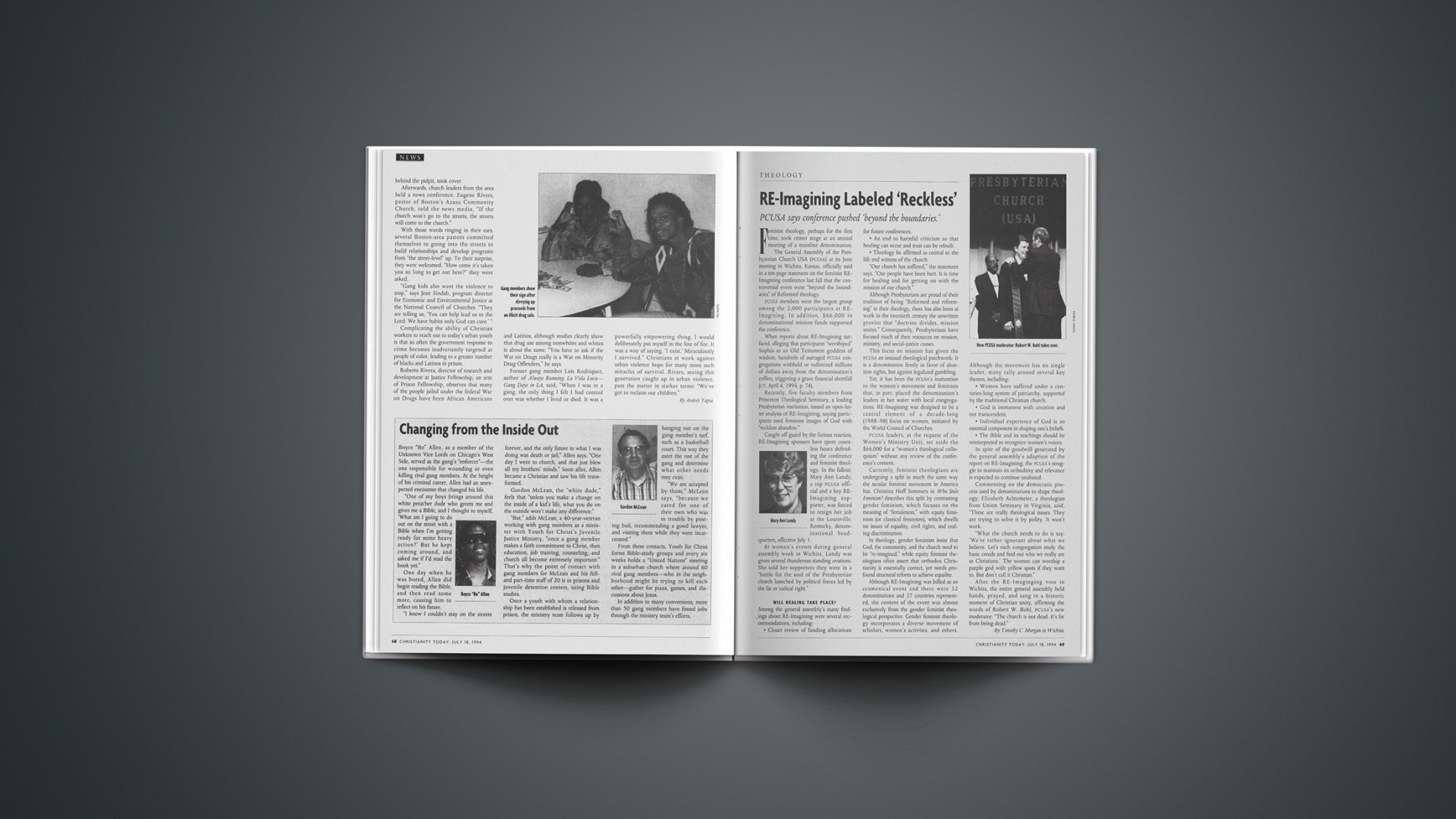Feminist theology, perhaps for the first time, took center stage at an annual meeting of a mainline denomination. The General Assembly of the Presbyterian Church USA (PCUSA) at its June meeting in Wichita, Kansas, officially said in a ten-page statement on the feminist RE-Imagining conference last fall that the controversial event went “beyond the boundaries” of Reformed theology.
PCUSA members were the largest group among the 2,000 participants at RE-Imagining. In addition, $66,000 in denominational mission funds supported the conference.
When reports about RE-Imagining surfaced, alleging that participants “worshiped” Sophia as an Old Testament goddess of wisdom, hundreds of outraged PCUSA congregations withheld or redirected millions of dollars away from the denomination’s coffers, triggering a grave financial shortfall (CT, April 4, 1994, p. 74).
Recently, five faculty members from Princeton Theological Seminary, a leading Presbyterian institution, issued an open-letter analysis of RE-Imagining, saying participants used feminine images of God with “reckless abandon.”
Caught off guard by the furious reaction, RE-Imagining sponsors have spent countless hours defending the conference and feminist theology. In the fallout, Mary Ann Lundy, a top PCUSA official and a key RE-Imagining supporter, was forced to resign her job at the Louisville, Kentucky, denominational headquarters, effective July l.
At women’s events during general assembly work in Wichita, Lundy was given several thunderous standing ovations. She told her supporters they were in a “battle for the soul of the Presbyterian church launched by political forces led by the far or radical right.”
WILL HEALING TAKE PLACE?
Among the general assembly’s many findings about RE-Imagining were several recommendations, including:
* Closer review of funding allocations for future conferences.
* An end to harmful criticism so that healing can occur and trust can be rebuilt.
* Theology be affirmed as central to the life and witness of the church.
“Our church has suffered,” the statement says. “Our people have been hurt. It is time for healing and for getting on with the mission of our church.”
Although Presbyterians are proud of their tradition of being “Reformed and reforming” in their theology, there has also been at work in the twentieth century the unwritten proviso that “doctrine divides, mission unites.” Consequently, Presbyterians have focused much of their resources on mission, ministry, and social justice causes.
This focus on mission has given the PCUSA an unusual theological patchwork: It is a denomination firmly in favor of abortion rights, but against legalized gambling.
Yet, it has been the PCUSA’s inattention to the women’s movement and feminism that, in part, placed the denomination’s leaders in hot water with local congregations. RE-Imagining was designed to be a central element of a decade-long (1988-98) focus on women, initiated by the World Council of Churches.
PCUSA leaders, at the request of the Women’s Ministry Unit, set aside the $66,000 for a “women’s theological colloquium” without any review of the conference’s content.
Currently, feminist theologians are undergoing a split in much the same way the secular feminist movement in America has. Christina Hoff Sommers in “Who Stole Feminism?” describes this split by contrasting gender feminism, which focuses on the meaning of ”femaleness,” with equity feminism (or classical feminism), which dwells on issues of equality, civil rights, and ending discrimination.
In theology, gender feminists insist that God, the community, and the church need to be “re-imagined,” while equity feminist theologians often assert that orthodox Christianity is essentially correct, yet needs profound structural reform to achieve equality.
Although RE-Imagining was billed as an ecumenical event and there were 32 denominations and 27 countries represented, the content of the event was almost exclusively from the gender feminist theological perspective. Gender feminist theology incorporates a diverse movement of scholars, women’s activists, and others. Although the movement has no single leader, many rally around several key themes, including:
* Women have suffered under a centuries-long system of patriarchy, supported by the traditional Christian church.
* God is immanent with creation and not transcendent.
* Individual experience of God is an essential component in shaping one’s beliefs.
* The Bible and its teachings should be reinterpreted to recognize women’s voices.
In spite of the goodwill generated by the general assembly’s adoption of the report on RE-Imagining, the PCUSA’s struggle to maintain its orthodoxy and relevance is expected to continue unabated.
Commenting on the democratic process used by denominations to shape theology, Elizabeth Achtemeier, a theologian from Union Seminary in Virginia, said, “These are really theological issues. They are trying to solve it by polity. It won’t work.
“What the church needs to do is say: ‘We’re rather ignorant about what we believe. Let’s each congregation study the basic creeds and find out who we really are as Christians.’ The women can worship a purple god with yellow spots if they wan to. But don’t call it Christian.”
After the RE-Imagining vote in Wichita, the entire general assembly held hands, prayed, and sang in a historic moment of Christian unity, affirming the words of Robert W. Bohl, PCUSA’s new moderator: “The church is not dead. It’s far from being dead.”
Copyright © 1994 Christianity Today. Click for reprint information.
ctjul94mrw4T80185619










